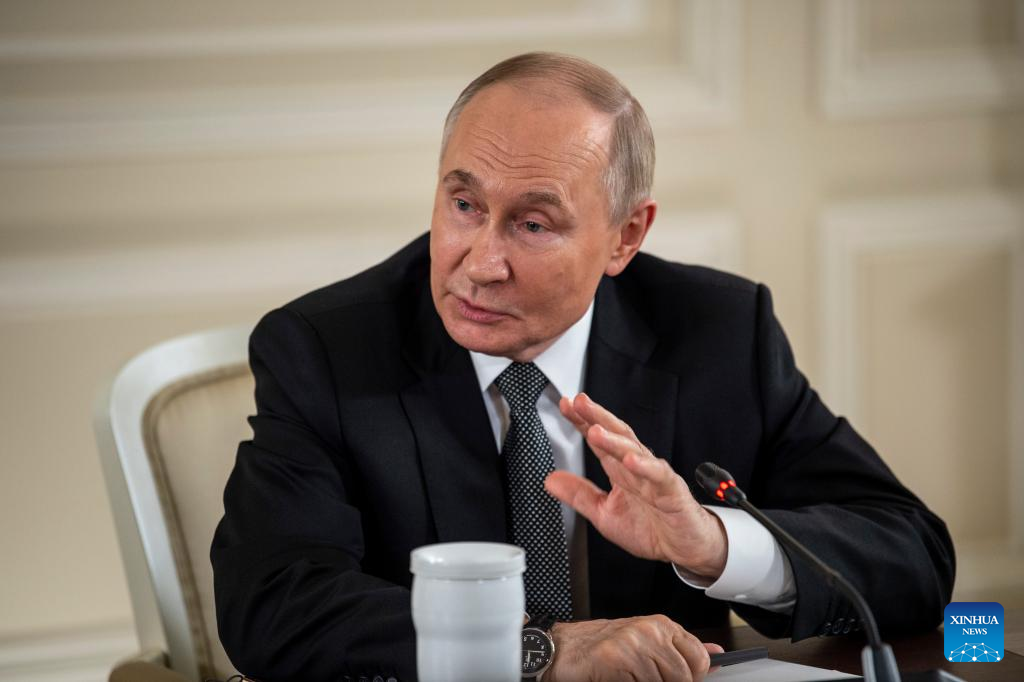
MOSCOW - Russia and China will continue to work together to ensure the prosperity of the two great nations, Russian President Vladimir Putin has said.
In a written interview with Xinhua on the eve of his visit to China to attend the Shanghai Cooperation Organization (SCO) Tianjin Summit and China's V-Day commemorations in Beijing, Putin also said that during his visit, he will join the Chinese side in commemorating the 80th anniversary of the great victory and engage in in-depth discussions on new prospects and measures for mutually beneficial cooperation to bring benefits to the peoples of Russia and China.
Calling Chinese President Xi Jinping's visit to Russia in May a "resounding success", Putin said the visit drew wide international attention and was highly regarded in his country, with its achievements including a comprehensive joint statement and the signing of a substantial package of bilateral documents.
Xi's visit had "deep symbolic significance to the further development of Russian-Chinese relations", Putin said. "We reaffirmed the strategic choice of our peoples in favor of strengthening the traditions of good-neighborliness, friendship, and long-term, mutually beneficial cooperation."
"Very soon, at the invitation of President Xi, I will pay a return visit to China," Putin said, adding that he looks forward to in-depth discussions with Xi on all aspects of the bilateral agenda, and exchanges of views on pressing regional and international issues.
"In Russia, we deeply value the Chinese leader's genuine commitment to advancing our comprehensive partnership and strategic cooperation," Putin said.
Putin stressed that Xi treats his country's history with utmost respect. "He is a true leader of a great world power, a man of strong will, endowed with strategic vision and a global outlook, and unwavering in his commitment to national interests. It is of exceptional importance for China that such a person stands at the helm at this challenging, pivotal moment in international affairs," Putin said.
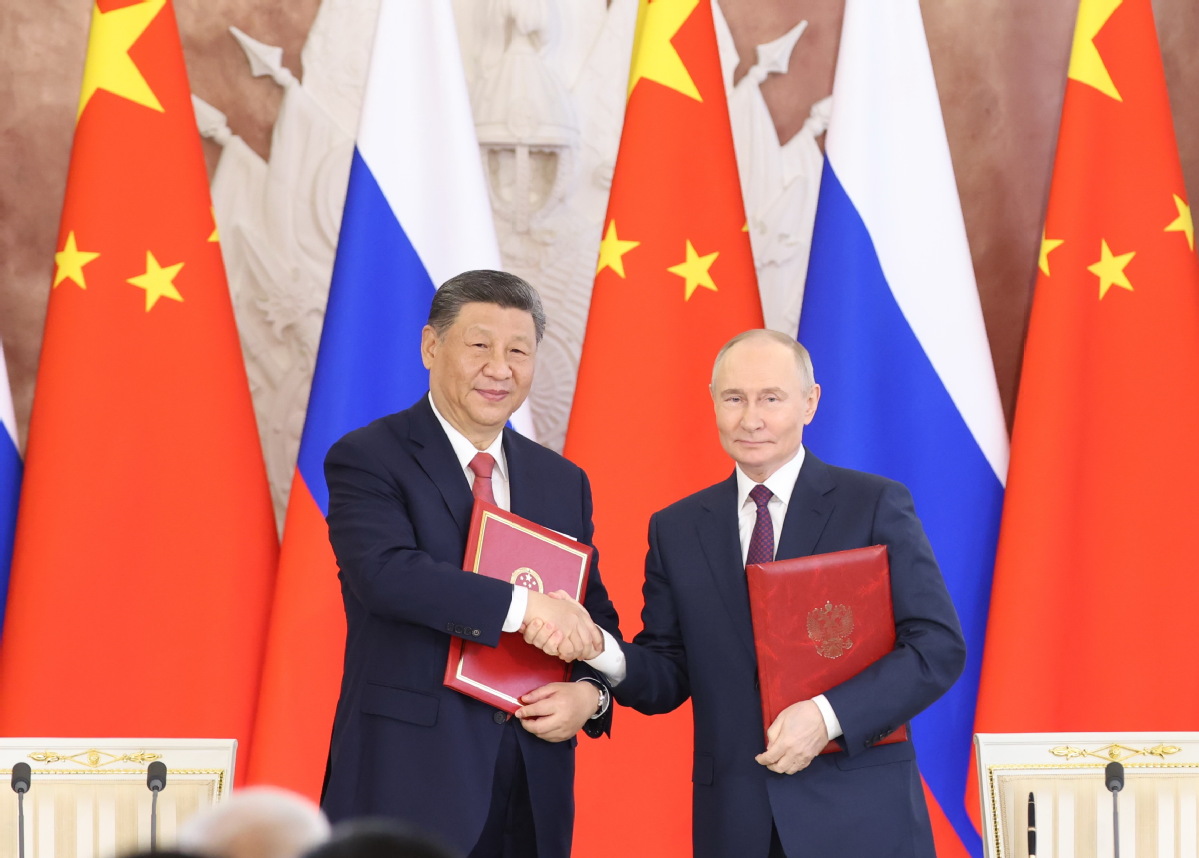
In Beijing, Putin said, he will join the Chinese side to pay tribute to the shared act of heroism of their fathers, grandfathers and great-grandfathers, to honor the memory of those who sealed the brotherhood of the two peoples with their blood, defended the freedom and independence of the two states, and secured their right to sovereign development.
The peoples of the Soviet Union and China bore the brunt of the fighting and suffered the heaviest losses, Putin stressed. "It was our citizens who endured the greatest hardships in the struggle against the invaders and played a decisive role in defeating Nazism and militarism," he said.
"Through those severe trials, the finest traditions of friendship and mutual assistance were forged and strengthened - traditions that today form a solid foundation for Russian-Chinese relations," Putin said.
"In Russia, we will never forget that China's heroic resistance was one of the crucial factors that prevented Japan from stabbing the Soviet Union in the back during the darkest months of 1941-1942," Putin said. "This enabled the Red Army to concentrate its efforts on crushing Nazism and liberating Europe."
When Japan treacherously launched a war of aggression against China, the Soviet Union extended a helping hand to the Chinese people, Putin noted, adding that "Soviet pilots also fought bravely alongside their Chinese brothers-in-arms."
"It is our sacred duty to honor the memory of our compatriots who displayed true patriotism and courage, endured all hardships, and defeated powerful and ruthless enemies," Putin said, expressing gratitude to China for its careful preservation of memorials to Red Army soldiers who gave their lives in battles.
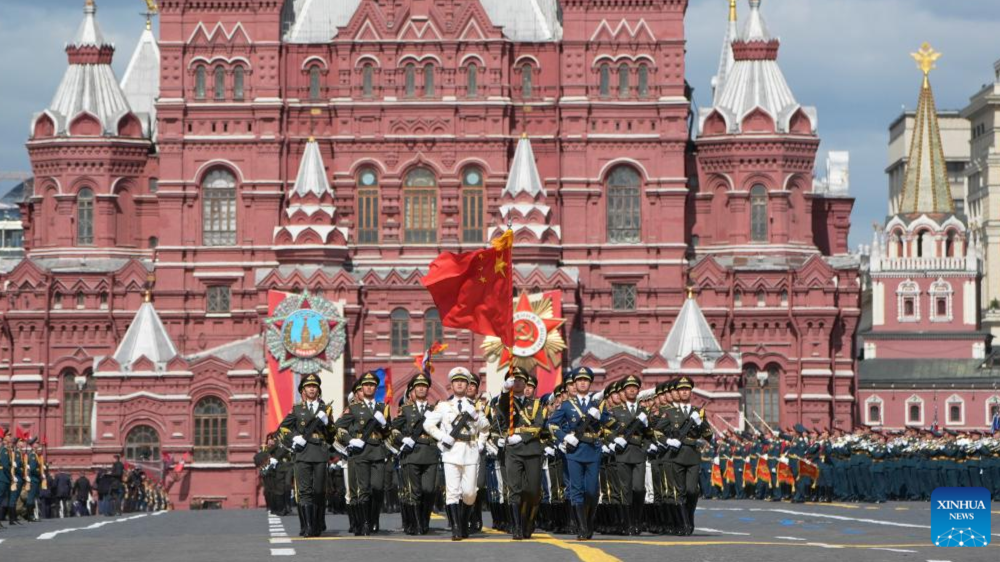
In certain Western states, the results of the Second World War are "de facto revised", Putin said, noting that historical truth is being distorted and suppressed to serve their current political agendas.
Russia and China resolutely condemn any attempts to distort the history of the Second World War, he said. "The results of that war are enshrined in the UN Charter and other international instruments. They are inviolable and not subject to revision."
On economic and trade cooperation, Putin said that economic relations between Russia and China have reached an unprecedented level. Since 2021, he noted, bilateral trade has grown by about $100 billion.
In terms of trade volume, China is by far Russia's leading partner, while last year Russia ranked fifth among China's foreign trade partners, he said, adding that transactions between Russia and China are almost completely carried out in rubles and yuan.
Russia firmly retains its position as a leading exporter of oil and gas to China, Putin said, adding that the two sides continue their joint efforts to reduce bilateral trade barriers.
"In recent years, the export of pork and beef to China has been launched. Overall, agricultural and food products occupy a prominent place in Russia's exports to China," he said.
Bilateral investment volumes are growing, and large-scale joint projects are being implemented in priority sectors, Putin said, adding that the two countries are cooperating closely in industry.
"Russia is one of the world's principal markets for Chinese car exports," he said. "Together, we are building high-tech manufacturing and infrastructure facilities. We also have large-scale plans in the construction materials industry."
"To sum up, economic cooperation, trade and industrial collaboration between our countries are advancing across multiple areas. During my upcoming visit, we will certainly discuss further prospects for mutually beneficial cooperation and new steps to intensify it for the benefit of the peoples of Russia and China," Putin said.
Noting that large-scale bilateral cultural and people-to-people initiatives make a significant contribution to fostering friendly relations, Putin said that cultural exchanges between Russia and China continue to develop dynamically.
The Roadmap for Russia-China Cooperation on People-to-People and Cultural Exchanges Before 2030, which includes more than 100 major projects, is being consistently implemented, Putin said.
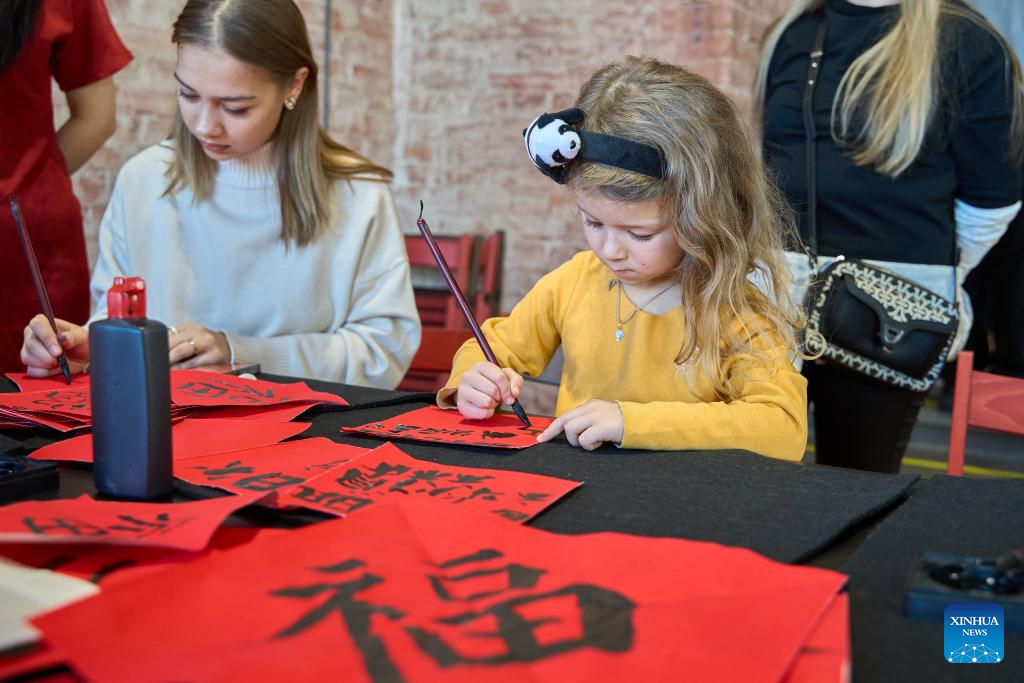
Highlighting the successful organization of the Russia-China Years of Culture, held in 2024-2025, Putin said that the rich and diverse programme was met with enthusiastic acclaim in both Russia and China.
Education and science remain especially promising areas for cooperation, Putin said, noting that academic mobility and inter-university contacts continue to grow. Today, more than 51,000 Chinese students are studying in Russia, while 21,000 Russian students are studying in China, he said.
Cooperation in science, technology and innovation is also expanding, he said, adding that sports cooperation has also been productive while film production is another vibrant area of cooperation.
"Tourism is another important sphere I would like to note. The figures here are encouraging: in 2024, mutual tourist flows had increased by 1.5 times, reaching 2.8 million trips," he said, adding that the two sides have also advanced cooperation in such areas as youth, media, and archives.
It is encouraging that bilateral cultural and people-to-people cooperation continues to gain momentum, Putin said. "This is undoubtedly a strategic dimension of our relationship, helping to build a broad public base of friendship, good-neighborliness, and mutual understanding."
ALSO READ: Russia ready to strengthen stature of SCO
China holds the rotating presidency of the SCO for 2024-2025. In 2025, the SCO summit will be held in Tianjin. Putin expressed expectation that the summit will inject powerful new momentum into the SCO, strengthen its capacity to respond to contemporary challenges and threats, and consolidate solidarity across the shared Eurasian space. "All this will help shape a fairer multipolar world order," he said.
The SCO's appeal lies in its simple but powerful principles: A firm commitment to its founding philosophy, openness to equal cooperation, not targeting third parties, and respect for the national characteristics and uniqueness of each nation, he said.
"Drawing on these values, the SCO contributes to shaping a fairer, multipolar world order, grounded in international law, with the central coordinating role of the United Nations," he said.
"A major element of this global vision is the creation in Eurasia of an architecture of equal and indivisible security, including through close coordination among SCO member states," he added.
Expressing confidence that the Tianjin summit will mark an important milestone in the SCO's history, Putin said that the Russian side fully supports the priorities declared by the Chinese presidency, which focus on consolidating the SCO, deepening cooperation in all areas, and enhancing the organization's role on the global stage.
"I am confident that, through our joint efforts, we will give the SCO new momentum, modernizing it to meet the demands of the time," he said.
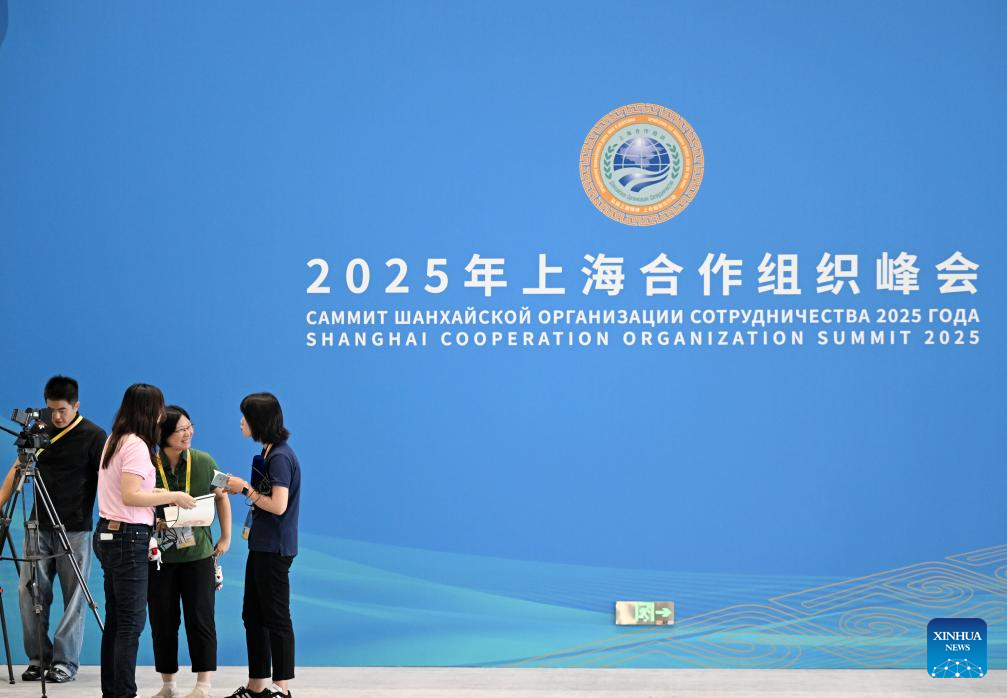
Putin spoke highly of the cooperation between Russia and China in multilateral formats, saying such cooperation is a key pillar of bilateral relations and plays a major role in global affairs.
Time and again, exchanges of the two countries on critical international issues have shown that Moscow and Beijing share broad common interests and strikingly similar views on fundamental questions, he said.
The Russia-China strategic coordination acts as a stabilizing force, he said, adding that challenges and threats remain a constant focus of the bilateral political dialogue between the two sides.
Russia's concept of creating a common space of equal and indivisible security in Eurasia resonates closely with the Global Security Initiative proposed by Xi.
He also said that the interaction between Russia and China at the United Nations is at an unprecedentedly high level, fully reflecting the spirit of comprehensive partnership and strategic cooperation.
Both countries attach special importance to the Group of Friends in Defense of the UN Charter, a vital mechanism for consolidating the Global South, said Putin, adding that "Russia and China support reforming the UN so that it fully restores its authority and reflects modern realities."
The Russian leader said that close cooperation between Moscow and Beijing has positively shaped the work of leading economic forums, including the G20 and APEC.
"This year, our South African friends hold the G20 presidency. As a result of their efforts, we look forward to consolidating the Global South's achievements and establishing them as a foundation for the democratization of international relations. Within APEC, China's chairmanship in 2026 is expected to give fresh impetus to Russia-China engagement," he said.
Russia is working closely with China within BRICS, said Putin, adding that the two sides advance initiatives aimed at expanding economic opportunities for member states, including the creation of common platforms for partnership in strategic sectors.
READ MORE: Russia says cooperation with China makes key contributions to BRICS development
The two countries, he said, are paying special attention to mobilizing additional resources for critical infrastructure projects, and stand united in strengthening BRICS' ability to address pressing global challenges.
They take a common stand against discriminatory sanctions that hinder the socioeconomic development of BRICS members and the world at large, he added.
Putin said Russia and China support reforming the International Monetary Fund and the World Bank, adding that the two sides share the view that a new financial system must be built on the principles of openness and true equity, which can provide equal and non-discriminatory access to its tools for all countries and reflect the real standing of member states in the global economy.
"We seek progress for the benefit of all humanity. I am confident that Russia and China will continue to work together towards this noble goal, aligning our efforts to ensure the prosperity of our great nations," he said.


